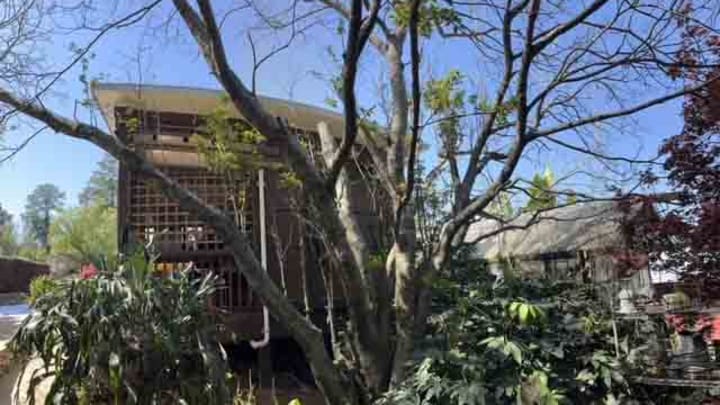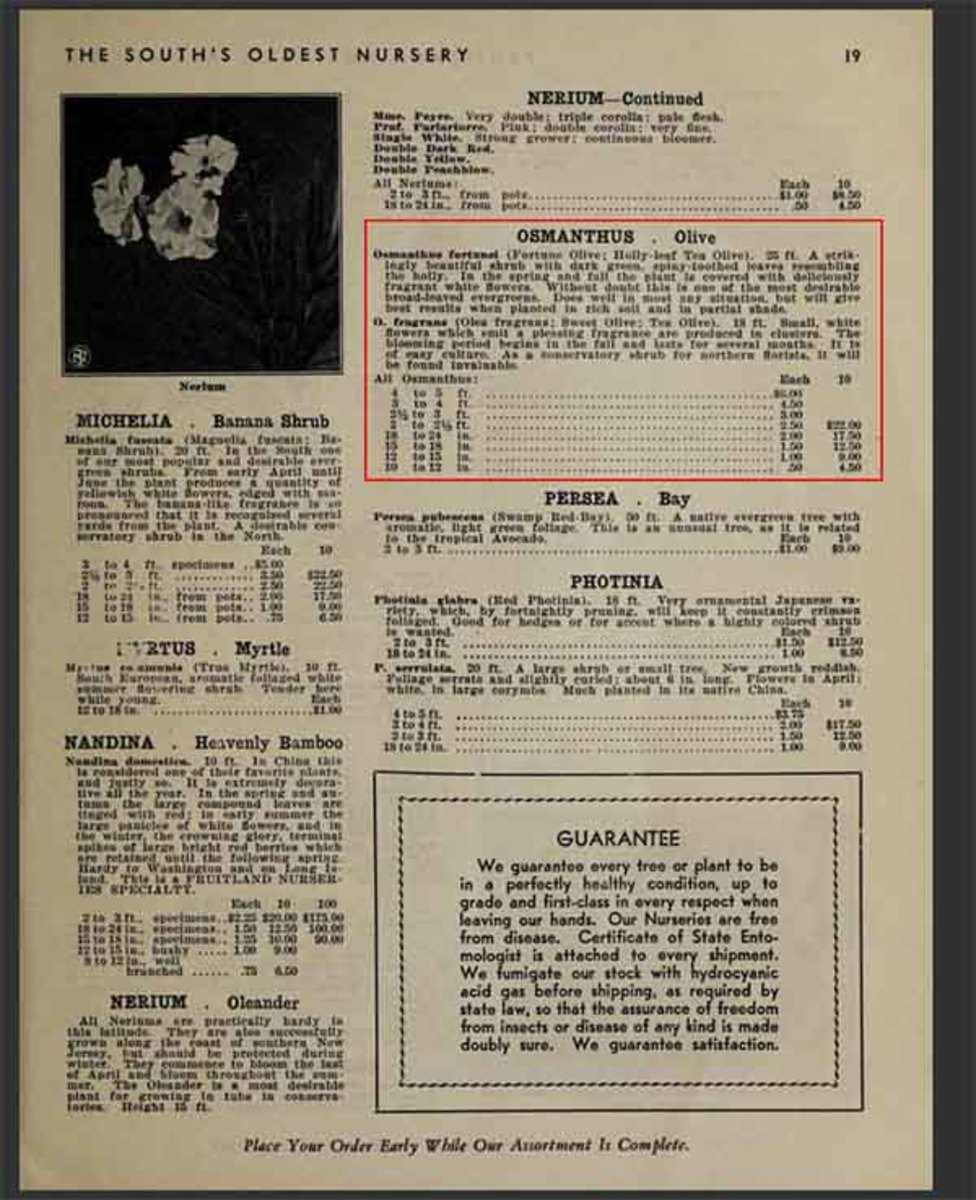The Most Compelling Tea Olive in Augusta Lives Just Outside the Masters

AUGUSTA, Ga. – The most famous Tea Olive in the world is 445 yards in length with an uphill climb and a slight bend to the right. It is deep green in color, speckled with white sands and guarded by towering pines.
The par-4 first hole at Augusta National is named after the Osmanthus Fragrans, the technical name for the Tea Olive, a fragrant shrub or small tree native to Asia but cultivated in America for its aromatic flowers. While not as popular as the holes at Amen Corner, Tea Olive has the distinction of being the opening hole of arguably the most famous golf course in the world — the kickoff to the most prestigious tournament in golf.
Less than a mile from the first hole tee box is another, far more obscure Tea Olive sprouting from the ground and towering some 25 feet, its limbs mostly leafless and its roots bubbling up from the surrounding soil.
Meet Uncle Joe.
Uncle Joe is estimated to be about 80 years old. He’s twice been transplanted, has survived hurricanes, tornadoes and ice storms, has seen 54 different Masters winners and dozens of course redesigns.
Uncle Joe lives behind a modest three-bedroom home on Magnolia Drive — not Magnolia Lane, the tree-lined entrance to Augusta National that sits just a few paces away. A climb up his branches would reveal, a quarter of a mile in the distance, the green wall of shrubs and vegetation that separate the golf course from this small, quaint neighborhood to its east.

Uncle Joe isn’t just neighbors with Augusta National. Uncle Joe is, in a way, family of Augusta National.
“It’s a pretty interesting story,” says Mike Harris, the 72-year-old owner of Uncle Joe who’s nurtured the tree for the last 52 years.
Joe Buck, Harris’ great uncle and the tree’s namesake, grew the Tea Olive tree while working at Fruitland Nurseries, for so long the South’s oldest nursery having opened in 1856. Fruitland Nurseries no longer exists, believed to have completely closed in the late 1960s.
But for years, Fruitland operated on the same property that now houses the other, more famous Tea Olive. Well-documented but not glamorized, the land in which Augusta National now spreads its immaculate fairways was once an expansive nursery of fruit and ornamental trees.
Not one but two of Harris’ relatives worked at the nursery cultivating and selling plantings. His grandfather, Charles Lever, worked alongside Buck, whose primary role was grafting roots and sprouts to produce new plants.
In fact, he used the sprouts of a specific Tea Olive tree to grow more Tea Olives. That tree now sits in his great nephew’s yard on Magnolia Drive.
“Uncle Joe is dead and gone, but it reminds me of him,” Harris says gesturing toward the tall tree, its bark aged and its limbs frail. “It doesn’t look like much right now.”
There’s a reason for that.
Uncle Joe is dying.
“I’m trying to save him,” Harris moans.
For Harris, saving Uncle Joe feels important for so many reasons. Uncle Joe is a family heirloom, passed down from Buck to his great nephew in 1968. Also, it took great trouble to nurture the tree: Uncle Joe went from the Fruitland Nurseries greenhouses to Buck’s yard in the mid-1940s to Harris’ parents’ yard and, finally, to Harris’ own yard.
There’s something else too: Uncle Joe is a piece, although distant, of Augusta National, surely one of the oldest living artifacts of a bygone era when the world’s most famous golf course was once a sprawling jungle of flowering trees.
Uncle Joe isn’t as old as the course, though. Fruitland Nurseries main property, in fact, closed in 1918 and Bobby Jones and partners purchased the land in 1931 to construct their world-class golf course. But in a little-known fact, Fruitland Nurseries continued to exist across the street from the course, says Harris, a claim backed up by still-existing copies of the nursery's annual catalog of fruit and trees. The catalogs date as recent as 1967.

“It was kind of like a garden center,” Harris recalls when he visited as a child. “They sold to the public. Most of the land got bought up, but they were growing and selling plants out of greenhouses.”
In many ways, Fruitland Nurseries is still an integral part of Augusta National. Berckmans Road runs along the north side of the course carrying the name of the nursery’s original owner, Louis Berckmans, a Belgian immigrant. The Berckmans’ family home, dubbed “Fruitland Manor,” still stands today. The building, built in the 1850s, serves as the Augusta National clubhouse and is the inspiration behind the Masters Tournament’s trophy design.
Around 1960, the Berckmans planted both the 61 Magnolia trees that form Magnolia Lane and the 40 varieties of azaleas that now dot the layout. That giant Oak tree that hugs the Masters clubhouse? The Berckmans planted that too.

After Jones acquired the property, he invited back Louis Berckmans’ grandsons to assist in the landscape design of the course. They had an idea: Each hole would identify with a collection of one special plant selected to adorn it. Soon enough, the new golf course was ablaze with color from thousands of botanical plantings, most memorably 400 Azaleas moved to No. 13. The par-5 13th is known as “Azalea.” The Berckmans even established a small nursery on the course to give Jones a continuous supply of plantings.
Those of course included Tea Olives.
On a breezy Thursday afternoon, Harris stands underneath Uncle Joe’s sprawling branches. There is sadness in his voice.
“He’s dying,” Harris says.
Harris has seen plenty in his day. He served two years in the Vietnam War and then worked as a medic. He would travel to the war zone on a turboprop aircraft to retrieve burned victims and transport them to a facility in San Antonio.
“Some of them,” he says, “wouldn’t have skin.”
After Vietnam, he returned to Augusta, bought the home in which he lives and then transplanted, for a second time, Uncle Joe from his parents’ yard to his new yard. For more than a half-decade, he’s lived in this place, a stone’s throw from Augusta’s green wall.

He can remember the days in which the event wasn’t so popular. Nowadays, the price for a weekend ticket can eclipse $1,000.
“You used to be able to walk over there (to the gate) and buy a ticket,” he says. “It’d be nothing for people leaving that course to just give the ticket away to you if they were going to leave town. They didn’t ask for no money.”
A mile from where Harris stood talking, thousands of patrons flooded into Augusta. They snaked down Washington Road, past Magnolia Lane, across Magnolia Drive and down River Ridge Drive, finally arriving at the golf course.
The first hole they see? Tea Olive.
More Round 2 Coverage from Morning Read
- Scheffler Opens Five-Shot Lead on Fun Day for Few
- Amen Corner was a Survival Test and Not Everyone Did
- Schwartzel Summons Old Masters Vibes to Contend
- Tiger 'Just Another Golfer' Expecting More Now
- The most compelling Tea Olive in Augusta
- Watch: Masters Day 3 Preview
